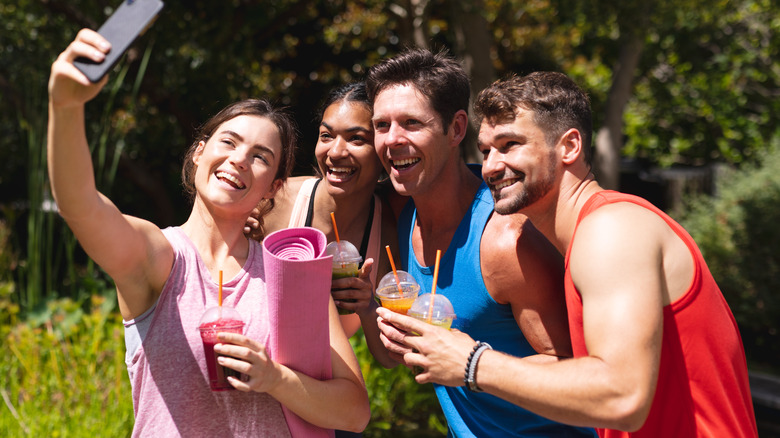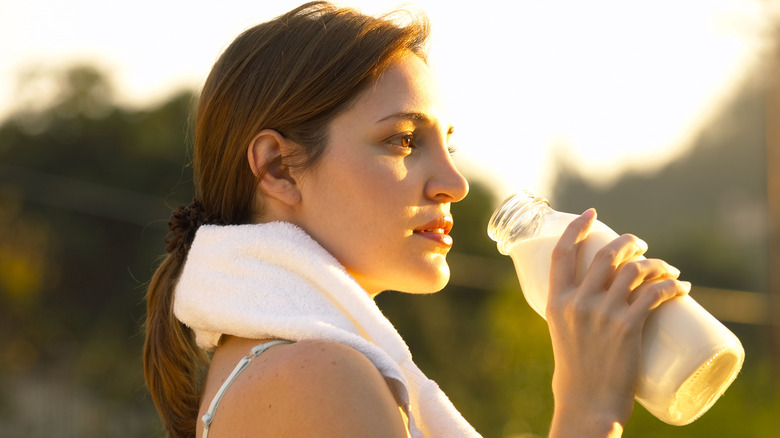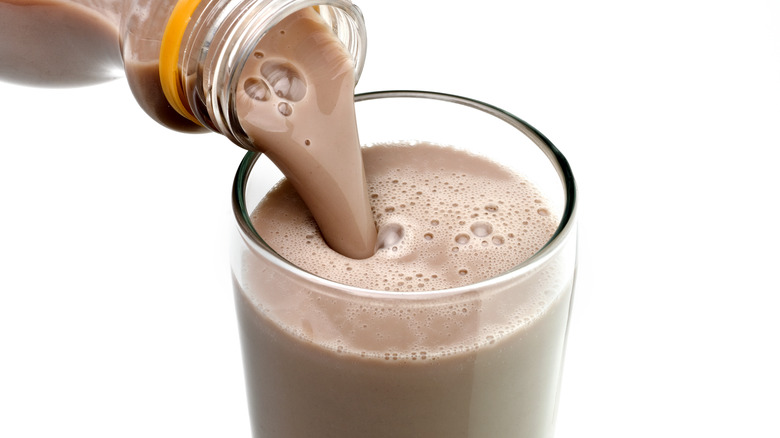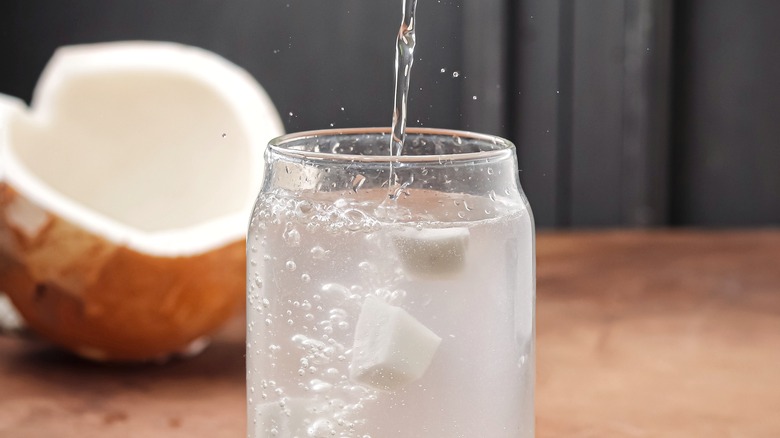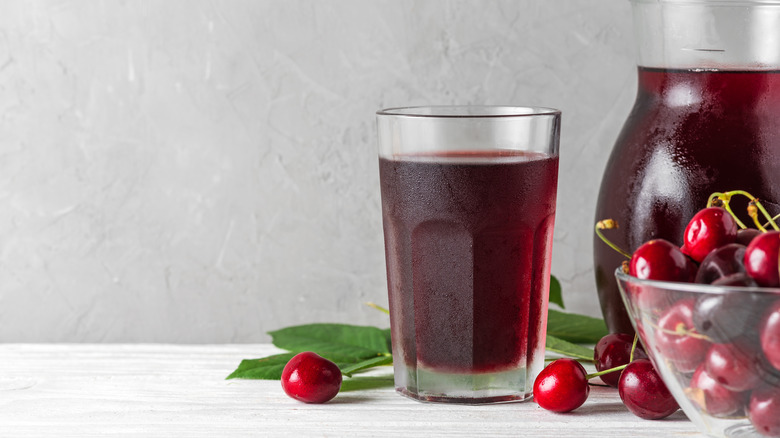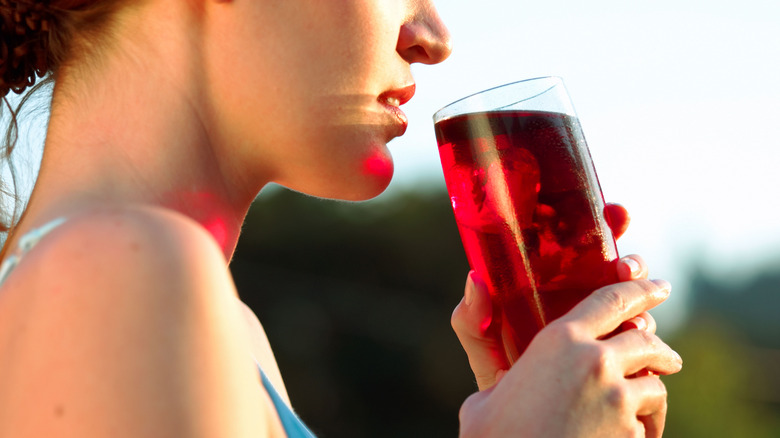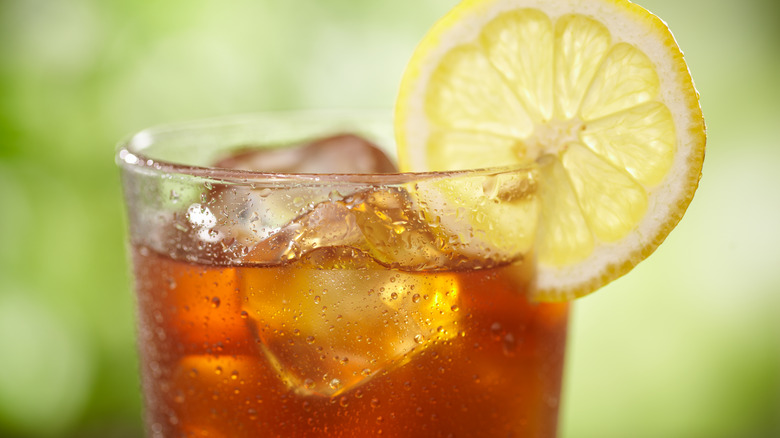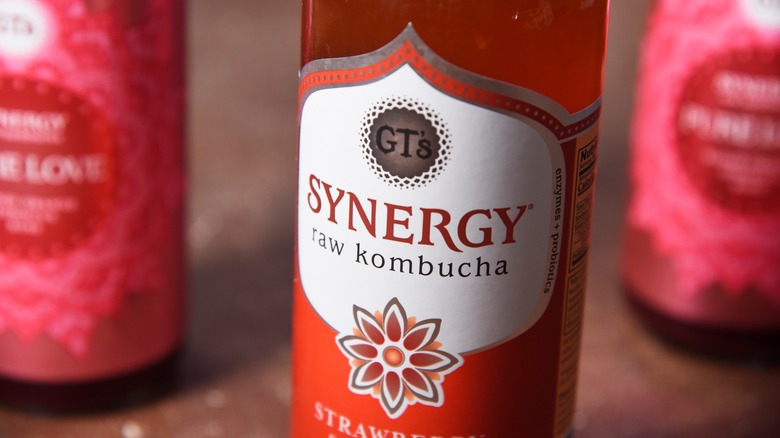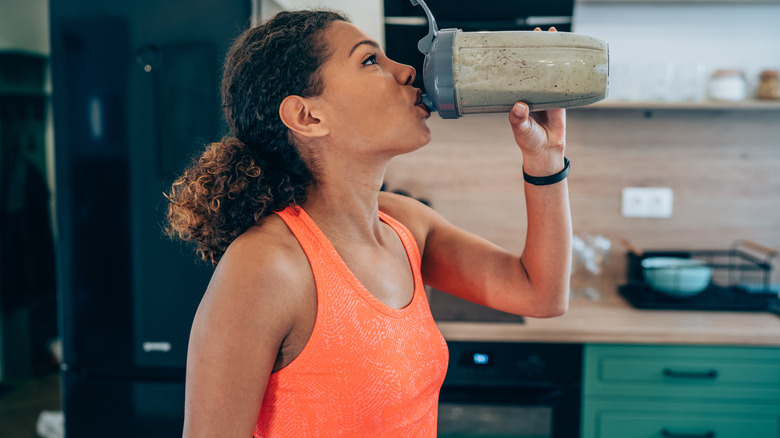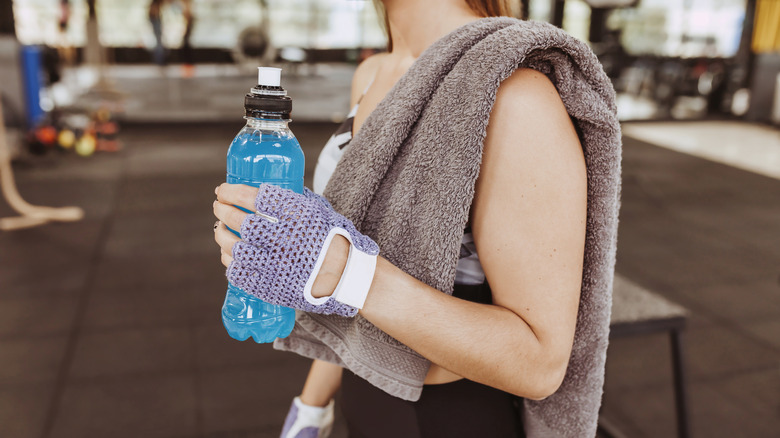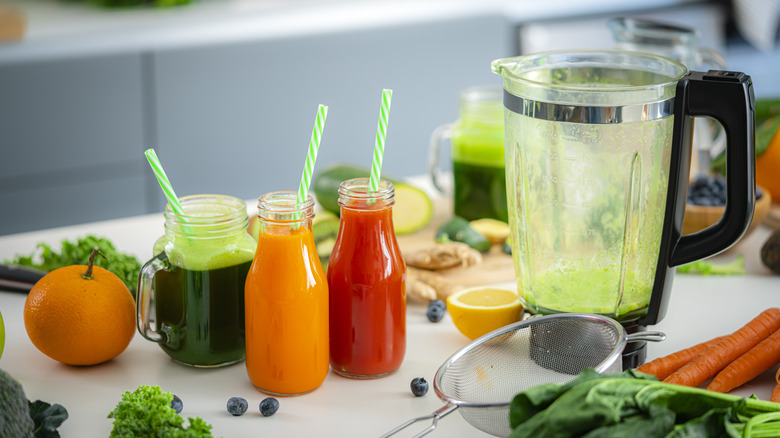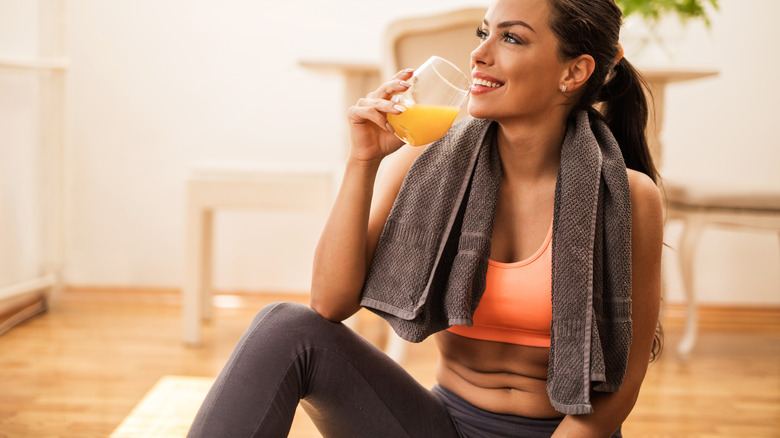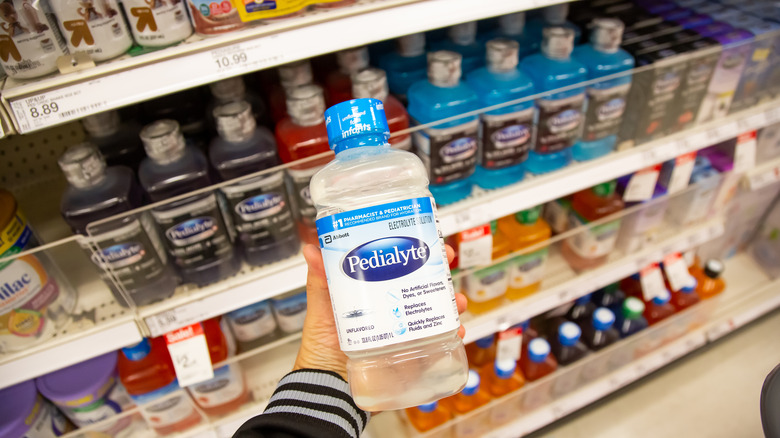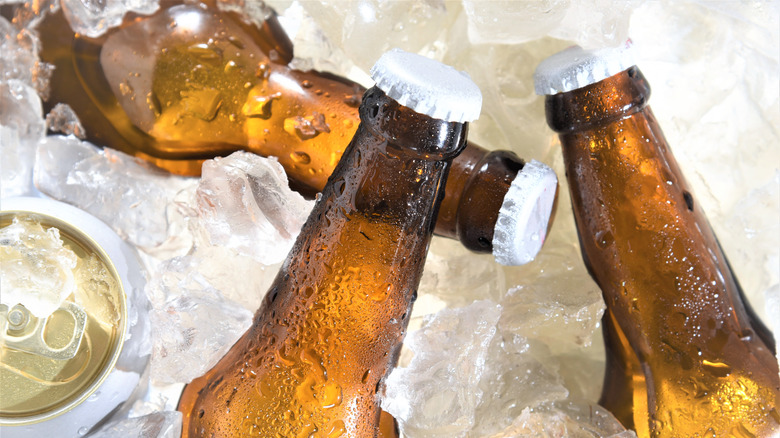The Best Drinks To Have After A Workout (That Aren't Water)
Just like there is no one-size-fits-all when it comes to your diet, hydration needs post-exercise can vary depending on the individual, the activity, the intensity, and the duration. Extreme heat conditions can come into play as well. For example, recreational workouts may not require much carb/protein repletion versus higher intensity workouts, according to Forbes. In such cases, tea, juice, or water — followed by a healthy snack or balanced meal — may be just fine. However, in more extreme athletic training, a protein shake or smoothie can be beneficial to achieve a desired 2:1 carb-protein combo after strength training or a 3:1 ratio after a long endurance aerobic workout. Additionally, when it comes to rehydration, extended periods of time in high heat may require the addition of electrolytes, which can be consumed in various forms, including sports drinks, coconut water, or even milk.
And while water is certainly always an optimal choice for hydrating, there are plenty of other beverages that may offer benefits, depending on your needs. Check out these options below.
1. Milk
"Milk does a body good" — perhaps you've heard that slogan of the 1980s. The "milk mustache" came about in the mid-'90s following a successful "Got Milk?" campaign in an effort to boost its sales when sodas and bottled teas dominated the market.
While "Got Milk?" wasn't focused on its nutritional value — but rather its appeal as a complement to other foods (e.g., "What is cereal without the milk?") — it remains clear that milk is a beverage that can support your health. It's got a balance of protein, carbs, and fats, as well as essential micronutrients calcium and vitamin D — most notable for bone health. It's also a filling, accessible, and convenient source of nutrition.
And, when it comes to post-workout repletion, low-fat milk may actually be more effective than commercial sports drinks, according to a 2008 review in the Journal of the International Society of Sports Nutrition. In fact, milk consumption may improve a favorable protein balance, according to the researchers. This is important because, while exercise does increase protein synthesis, its effects on protein degradation are greater. A benefit of milk is its casein-to-whey ratio of 3:1, which allows for better absorption of these proteins and sustained elevation of serum protein levels. And whey, which has a higher proportion of branched-chain amino acids, aiding in muscle retention. What's more, milk naturally contains high concentrations of electrolytes — namely sodium and potassium — which are depleted through fluid losses from sweating.
2. Chocolate milk
There's also good news for those who love chocolate milk. Drinking it may be just what you need for post-workout recovery. In fact, chocolate milk had a greater effect on sports performance than carbohydrate-rich sports drinks, according to a 2019 study in the Journal of the International Society of Sports Nutrition. Chocolate milk combines both protein and carbs. The combination of these macronutrients compared to one or the other alone may help to better reduce the body's stress response to athletic performance, the researchers say.
And, because there's some evidence that resistance training contributes to a rise in cortisol levels, repleting with both carbs and protein may be essential. Higher levels of this stress hormone not only may affect protein synthesis but may also increase its breakdown. As such, consuming protein post-workout may be necessary for repletion. Furthermore, carbohydrates are important for signaling the insulin response, which may help attenuate stress. Thus, the combination of protein and carbs in chocolate milk may be especially beneficial after athletic-level workouts.
3. Coconut water
If you love the sweet and nutty taste of coconut, coconut water can certainly be an option to rehydrate after a sweaty workout. And, with its natural electrolytes and digestive-friendly composition (no gut-wrenching sweeteners or additives), it may even be a better alternative to sports drinks.
Chloride, sodium, and potassium are three essential electrolytes necessary for signaling the body's senses — vision, hearing, touch, taste, and smell. Potassium is especially important for athletes as it maintains the body's pH, transports nutrients to the cells, maintains healthy blood pressure, and preserves bone health. Coconut water is not only rich in potassium, but it also contains sodium and magnesium, which are vital for replacing nutrients lost via sweat and heavy exercise, according to Cleveland Clinic.
And it may be just as effective in rehydrating post-exercise, according to a clinical trial in the Journal of Physiological Anthropology and Applied Human Science. The researchers concluded its usage causes less nausea and stomach upset, and that it could be tolerated in larger amounts than both plain water and electrolyte-rich sports beverages.
Furthermore, unsweetened coconut water is low in calories, has no added sugars, and has a high water content. Compared to some commercial sports drinks, which are often high in added sugars, it can be a better option. And, for athletes who train hard (over an hour), coconut water enriched with sodium can be beneficial, says registered dietitian nutritionist Maxine Smith for Cleveland Clinic. However, she does caution that the electrolytes in coconut water can vary so sports drinks may be more reliable.
4. Tart cherry juice
Exercise can increase oxidative stress, heighten inflammation, and compromise muscle retention. Thus, antioxidant-rich post-workout repletion may be in order (per Current Sports Medicine Reports).
Tart cherry juice is packed with antioxidant potential with a wealth of phytochemicals — including anthocyanins and flavonoids, flavonols, and plenty of other phenolic compounds — to help boost recovery, according to a 2017 review in Current Sports Medicine Reports. In fact, the researchers report that tart cherry juice consumption may reduce muscle damage and exercise-induced pain and improve overall recovery for athletes.
However, they say it's important to note that prior studies have shown a downfall to consuming an excess dosage of certain antioxidants as they may inhibit the body's natural antioxidant enzymes. Such a case was found in vitamins C and E. Though these antioxidants aren't so potent in tart cherry juice, the question of whether high concentrations of any antioxidants would hinder the body's natural training adaptation response remains unanswered. Thus, there may not be enough benefit over cost for daily supplementation for athletes.
Because it may be impossible for the body to have the adaptative response when physically exhausted, the authors conclude that consuming tart cherry juice may help athletes recover after long endurance runs or taxing HIIT (high-intensity interval training) sessions and can be especially beneficial between events.
5. Cranberry juice
Let's hear it for cranberries! These bright red gems are rich in proanthocyanidins, plant compounds associated with the prevention of UTIs.
But did you know their phytonutrient capacity can also help reduce cholesterol and keep your blood pressure in check? There's a promising link between cranberry consumption and heart health, according to a 2016 report in Advances in Nutrition.
What's more, cranberry juice may be effective for post-workout recovery, according to registered dietitian Dr. Jenna A. Bell for Outside. So, if you've got sore legs after an intense workout, reach for unsweetened cranberry juice. It can ease that exercise-induced inflammation — the reason your muscles are tight and achy. In fact, cranberry juice provides a wealth of polyphenols, which aid in recovery. These antioxidant compounds may also reduce any stress-induced effects associated with exercise, like free-radical damage, according to Oxygen magazine (via Outside). Plus, they may also boost immunity to keep you going strong even during training intervals.
6. Iced tea
Need to hydrate after a heated workout? Iced tea is not only refreshing but also a great recovery drink. That's because tea is a source of antioxidants that can decrease oxidative stress. Oxidative stress can weaken athletic performance, according to a 2021 review in the International Journal of Environmental Research and Public Health. Catechins and tannins — found in green tea and black tea, respectively — are antioxidants that can be effective in reducing free radical damage, the researchers say.
Interestingly, tea may also stimulate osteoblast activity that may benefit bone health, according to a 2016 review in Food & Function. Intense exercise over long durations may contribute to losses in bone mineral density, according to The University of Colorado Anschutz Medical Campus. Because muscles are working hard, they may draw calcium from the bone to aid in contraction — this can deplete the mineral density of the bone, the researchers explain. While tea does not contain calcium, its effect on osteoblast activity may benefit bone integrity.
7. Kombucha
Strenuous exercise may result in bloating, nausea, cramps, and diarrhea, according to a 2022 review in the International Journal of Environmental Research and Public Health. The stress-induced microbial imbalance may also impact the immune system. Hence, probiotic support may be helpful in restoring a healthier gut balance after hard-core exercise.
Enter Kombucha: It is a fermented drink made from tea, sugar, yeast, and healthy bacteria. It boasts antioxidants that support immunity, reduce inflammation and help repair cellular damage. And let's not forget its high water content — important for hydration. And, because commercially sold Kombucha may not have more than 0.5% alcohol, it really isn't enough to elicit the dehydrating effects of an alcoholic beverage.
A word to the wise: It is best to drink kombucha after a workout because its carbonation may cause gas and stomach upset while exercising, according to health coach Sara Walls in an interview for Well + Good.
The benefits of drinking kombucha post-exercise are that it provides the benefits of tea as both a hydrating and antioxidant-rich drink, and the fermentation results in probiotic and prebiotic (gut-healthy) benefits.
8. Protein shake or smoothie
The combination of carbs and protein post-workout can do your body some good. Carbohydrate-rich drinks not only replenish glycogen stores, they also contribute to hydration, according to SportsCardiologyBC. Consuming protein can help replete tired, stressed muscles. Why not include a beverage that contains mostly carbs with some quality protein — a protein shake or smoothie? In fact, a drink with a 4:1 ratio of carbs to protein may quickly restore glycogen needs (per Hammer Nutrition).
Although a 3:1 ratio may be effective for athletes looking to establish/maintain lean muscle mass. How can you achieve a balance of carbs to protein? Box Life suggests blending one cup of OJ with a half scoop of protein powder and a bit of honey to meet the 4:1 ratio.
So, if you've been training long and hard, consider a protein shake or smoothie. The benefit of drinking this after your workout is that your body will utilize more of the protein it contains, registered dietitian Kate Patton explained to Cleveland Clinic. When your body is in a post-workout anabolic state, it is rebuilding muscle tissue which means it will be more efficient at utilizing the protein you are consuming. Additionally, it's an easy way to quickly meet your needs because it goes down so smoothly and you don't have to chew it.
9. Electrolyte sports drinks
Exhaustive exercise, especially in hot weather, causes both sodium and water losses that can lead to dehydration and electrolyte imbalances, according to a 2011 article in the Journal of Sports Science. Athletes can lose up to 10 liters of water and 7,000 milligrams of sodium as a result of vigorous, heat-induced training sessions, the researchers say.
For normal body water restoration, both sodium and water need to be replenished. For more rapid recovery, the authors suggest a high water intake with the inclusion of electrolytes. Electrolyte drinks can therefore be beneficial for athletes after a workout. Specific benefits of electrolyte sports drinks include the repletion of carbs and electrolytes, such as sodium and potassium, to recover from fluid losses. Some also contain certain amino acids that may aid in muscle recovery (via Unity Point).
And, while sports drinks are widely available, it is best to consume such electrolyte beverages only after high-intensity endurance activity that extends beyond an hour, according to Dr. Andrew Nish (via Unity Point). That's because the high sugar content found in many of these drinks can add to excessive caloric intake for the general public (those who partake in more recreational exercise). Most kids and adults don't burn that much fuel nor experience such extreme fluid/electrolyte losses. A habit of drinking electrolyte beverages in place of water can lead to weight gain and risk of obesity.
10. Vegetable juice
You can drink part of your 5 A Day to refresh after a workout and fuel your body, too! Fruit and vegetable juices are antioxidant-rich. As such, they may be effective in post-workout recovery.
Beetroot juice, in particular, may have more antioxidant potential than other fruit/vegetable beverages (including but not limited to tomato juice and carrot juice), according to a 2016 study in Nutrients. Its high nitrate content may reduce muscle-damaging effects from extremely intense activity. But, regardless of your choice, you can reap plenty of nutritional benefits when you drink your veggies. And if you have a juicer, you can certainly make your own.
No time or desire to make your own juice? There are plenty of convenient options available. Campbell's Original V8 vegetable juice contains two servings of vegetables per 8-ounce portion. It's a combo of carrots, celery, beets, lettuce, parsley, spinach, and watercress. It also contains plenty of salt, which contributes 640 milligrams of sodium per serving (unless it is a low-sodium variety). This savory beverage has been around for 80 years!
For those with a sweeter tooth, carrot juice may be more palatable. And there are a variety of blends to choose from available both at organic juice bars or even in most markets — including apple-carrot-celery, carrot-pineapple, and just simply carrot. Some common brands of carrot juice include Bolthouse Farms (available at Target) and Von's Signature Select. Or you can opt for R.W. Knudson Beet Juice, found at Walmart or online.
11. Orange juice
You already know orange juice is a rich source of vitamin C, an essential nutrient that can aid in immunity and antioxidant protection. But did you know that orange juice may be just as beneficial as electrolyte drinks for post-intense-workout repletion?
With its high water content, natural electrolytes, and twice the carbs of electrolyte drinks, orange juice may serve as an alternative post-exercise rehydration option, according to a 2019 study in the Journal of Nutrition and Health Sciences. The higher carb content may aid by fueling more muscle glycogen for improved recovery, the researchers say. And, it is a hydrating and palatable option — as confirmed by the study's participants who consumed 100% pure orange juice versus plain water or commercial electrolyte beverage. Furthermore, the study resulted in no significant gastrointestinal issues when consumed after moderate-intense 80-minute cycling. Hence, orange juice may be considered suitable and effective for quenching thirst and repleting both carbs and electrolytes following prolonged, moderate-intense exercise.
12. Pedialyte
Don't let the name fool you: Pedialyte is not just for kids and it's not just an over-the-counter treatment for those who are bedridden or chained to the toilet. Sure, the oral solution is used to replete fluid losses due to vomiting, diarrhea, heat exhaustion, and occasional morning sickness. But, It may also be used to rehydrate and restore electrolyte balance after long, intensive exercise, according to RiteAid.
That's because Pedialyte beverages are specifically designed to hydrate and replace electrolyte losses much quicker than water, juice, and typical sports drinks. With essential electrolytes for recovery — sodium, potassium, and chloride — Pedialyte is also lower in sugars and calories than other types of electrolyte beverages on the market, according to Nao Medical.
Nao Medical recommends basing your dosage on your body weight, the intensity of your workout, and how hot your environment is. The rule of thumb: Drink 16 to 20 ounces per pound of fluid loss after exercise. You may combine water and Pedialyte to meet these needs. But, while Pedialyte may offer a great solution for extreme fluid losses (Think high-intensity, long, hot, athletic-driven workouts.), it does contain at least twice the sodium of the average sports drink, which may not be necessary for a moderate cardio workout of one hour or less.
13. Beer
Yep, you read this correctly. Beer may be an effective post-workout beverage, according to a 2021 systemic review in the International Journal of Sport Nutrition and Exercise Metabolism. But, the caveat is that it must be lower in alcohol — less than or equal to 4% ABV (alcohol by volume) and essentially a light beer. It should also be enhanced with sodium (which can negatively affect its taste), and consumed in moderation. Too much alcohol will have detrimental effects, including impairment of balance and focus as well as dehydration.
As a fermented beverage consisting of water, hops, and malted cereals, beer may be helpful in providing some antioxidant value, the researchers say. In fact, they note that, according to one study, its polyphenol content may have some benefit on athletic performance — though beer varies widely in composition and the research is mixed. In other studies, adding a little sodium to light beer showed a positive impact on fluid balance (rehydration).
But don't reach for that bottle of beer just yet. Keep in mind: The average beer is 5% ABV and the amount that may constitute "moderation" will differ depending on the individual. According to the Mayo Clinic, moderate consumption of beer is one 12-ounce beverage for women and up to two per day for men. And, alcohol's effect on an individual can vary, depending on weight, body composition, and tolerance. Furthermore, alcohol intake is often influenced by both social and emotional factors and may be harder to regulate than you may think.

